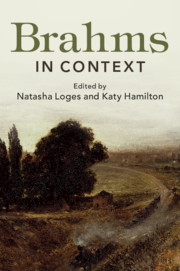Book contents
- Brahms in Context
- Brahms in Context
- Copyright page
- Dedication
- Contents
- Illustrations
- Music Examples
- Notes on Contributors
- Preface
- Abbreviations
- Part I Personality, People and Places
- Part II Identities, Environments and Influences
- Chapter 8 Finances
- Chapter 9 As Pianist
- Chapter 10 As Conductor
- Chapter 11 As Arranger
- Chapter 12 As Editor
- Chapter 13 As Teacher
- Chapter 14 Private Music-Making
- Chapter 15 Concert Life
- Chapter 16 Genre
- Chapter 17 Folk Music
- Chapter 18 Early Music
- Part III Performance and Publishing
- Part IV Society and Culture
- Part V Reception and Legacy
- Further Reading
- Index
- References
Chapter 18 - Early Music
from Part II - Identities, Environments and Influences
Published online by Cambridge University Press: 15 May 2019
- Brahms in Context
- Brahms in Context
- Copyright page
- Dedication
- Contents
- Illustrations
- Music Examples
- Notes on Contributors
- Preface
- Abbreviations
- Part I Personality, People and Places
- Part II Identities, Environments and Influences
- Chapter 8 Finances
- Chapter 9 As Pianist
- Chapter 10 As Conductor
- Chapter 11 As Arranger
- Chapter 12 As Editor
- Chapter 13 As Teacher
- Chapter 14 Private Music-Making
- Chapter 15 Concert Life
- Chapter 16 Genre
- Chapter 17 Folk Music
- Chapter 18 Early Music
- Part III Performance and Publishing
- Part IV Society and Culture
- Part V Reception and Legacy
- Further Reading
- Index
- References
Summary
To define what Brahms thought of as ‘early music’ is not difficult. It was essentially the same view as that of his musical contemporaries, particularly those in the German-speaking world. For them, it ended with the works of Johann Sebastian Bach and Georg Friedrich Händel (since they thought of him as German); it began roughly in the era that we think of as the mid-Renaissance, in particular with composers who were important contributors to the development of church music. For Catholics, interest centred on the works of Palestrina and his contemporaries, extending to seventeenth-century composers in the religious tradition. For Lutherans,the history that began with Martin Luther and culminated in the works of Bach was a principal thread that included composers such as Heinrich Isaac, Ludwig Senfl, Johannes Eccard, Michael Praetorius and Heinrich Schütz.
- Type
- Chapter
- Information
- Brahms in Context , pp. 175 - 184Publisher: Cambridge University PressPrint publication year: 2019

